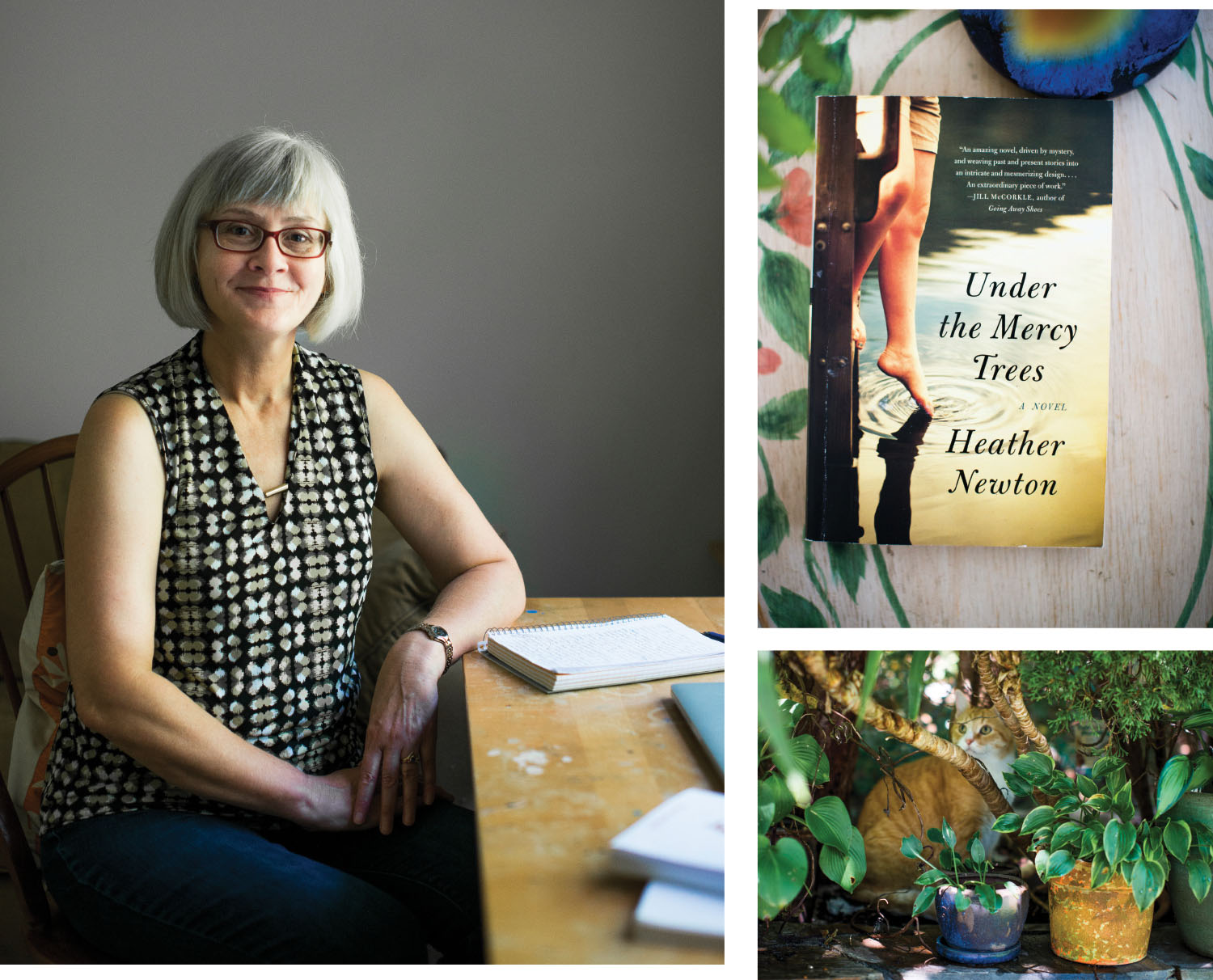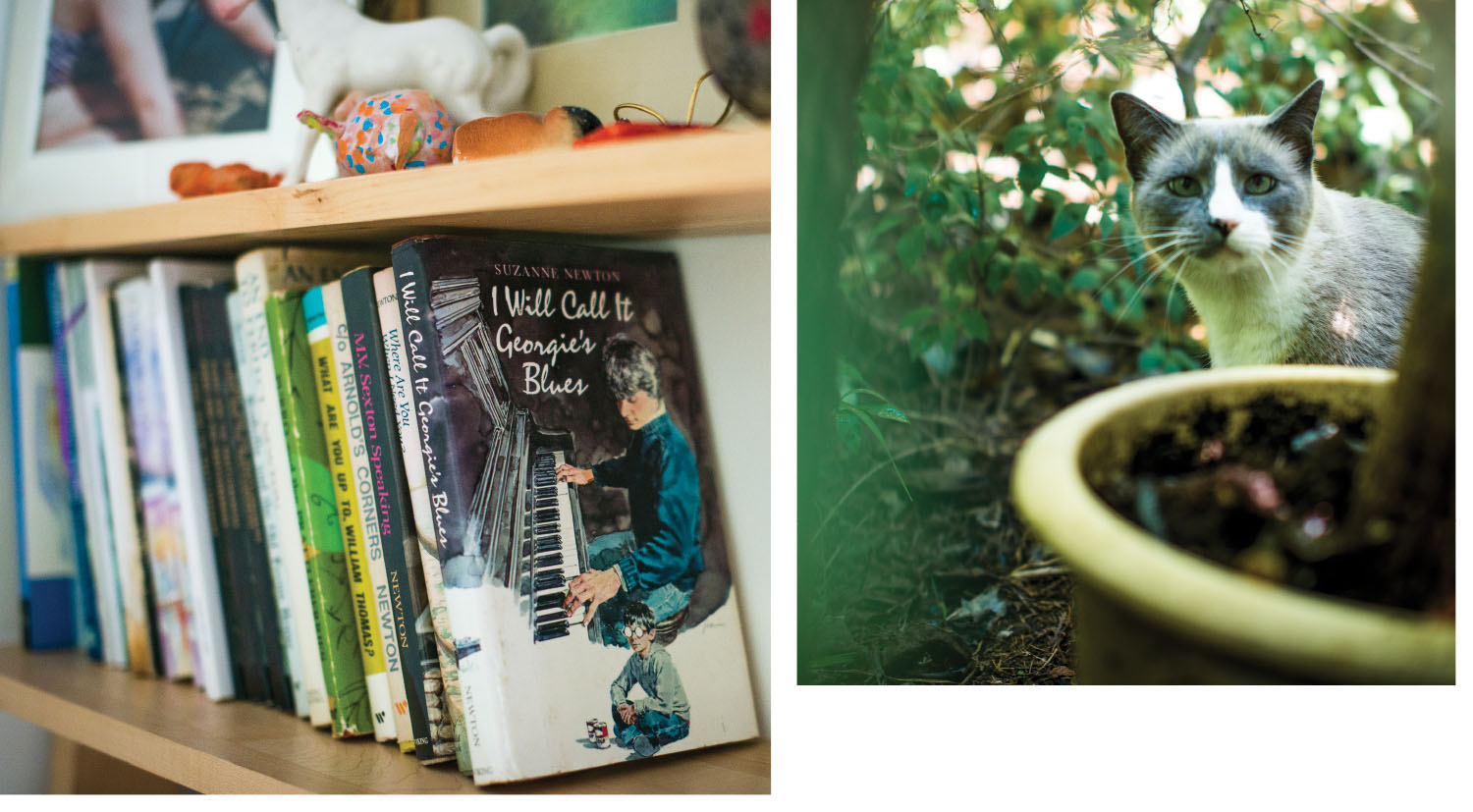
Photos by Karin Strickland
Novelist Heather Newton has a sparsely decorated home office, and on her bookshelf sits a clue about her pragmatism. There, tucked alongside other locally written novels, is the collection of nine highly decorated young-adult books by her mother, Suzanne Newton, including four ALA Best Books and one title, In Care of Arnold’s Corners, that was optioned for Disney.
“I think the main benefit of having a mother who is a writer is that you have no romantic notions whatsoever. You do not think you’ll be rich. You just do it because the stories keep coming and it’s fun,” says Newton.
As for herself, “I didn’t plan to become a writer,” she says. “It just happened.” Newton is the author of Under the Mercy Trees, winner of the 2011 Thomas Wolfe Memorial Literary Award. The book is about a failed New York playwright who returns to his Western North Carolina hometown to help find his missing brother and confront his own past.
But Newton isn’t “just” a novelist. She’s also a lawyer whose office is in the same building as the Flatiron Writers Room — an organization, co-launched by Newton, that supports serious writers in Western North Carolina. She’s now the program manager. (The original group was launched in the Flatiron Building downtown, but the Flatiron Writers Room is located in West Asheville.)
“I have a child who just started college, so I will be keeping all of my jobs for a while,” she remarks. “One nice thing about being a lawyer is you can reinvent your practice to fit the rest of your life. I have a non-jury practice and I can control my own schedule. I don’t see retiring from the law anytime soon. I do hope to sell another book in the next year.”
Her desk overlooks a garden tended by her husband, Michael Cox. Two rescue cats, orange tabby Cupcake and Siamese-mix Kyle, meander in and out during the day.
How did you end up living in Asheville?
I’ve been here since 1992. My sister was here and I was working at a big law firm in Boston. I paid off my student loans and saved up enough money to buy some time to write, but I needed a cheaper place to live. So I moved here. I met my husband here and stayed. I’ll never willingly move.
What did you do during your early time in town?
I wrote. I quit my job that January, traveled for a couple of months, and came to Asheville in March. I wrote on a novel until I had to start studying for the bar exam in June. I finished that novel and never published it. It was your typical first novel, which is basically cutting your teeth. I’ve got a few under the bed [that I wrote] before Under the Mercy Trees was sold.
What did you learn from those early attempts?
I guess I learned structure and the discipline of sitting down and getting it done.
How do you balance being a lawyer and a writer?
Badly. Actually I’ve worked it out over the years where I set aside Fridays to write, and if I can steal more time during the week, I will. Four times or so during the year, I try to do a five-day retreat. My husband and I have a cabin in Georgia that I go to. That gives me more time to delve into writing than I do on a regular basis.
What are you writing now?
I finished a novel that my agent is shopping now. I’m about 200 pages into another novel that is about an aging puppeteer and his daughters, all by different mothers.
What’s the first one about?
It’s about a woman who begins to come to terms with her own racism when the high school where she teaches, and from which she graduated, holds its first integrated prom in 2014. It’s set in Eastern North Carolina. We’re trying to find a good place for that book.
How nerve-racking is it knowing you have a book being shopped?
I just try to put it out of my mind and move on to the next thing and let my agent do her job. It’s not too bad. It’s hard to get published, but there are some interesting opportunities out there with combining audiobook sales with a print partner, so that’s what we’re looking at.
You’ve been in Asheville through more than 25 years of growth and cultural changes. How would you describe the current literary scene?
There are exciting things going on, especially with collaborative works and people crossing and mingling genres. The Flatiron Writers Room is about to start hosting a quarterly coalition of the many literary organizations and groups working in the area, to see how we can support each other. My one concern is that the influx of wealth into Asheville, and high housing costs, are driving out artists and writers and making us less diverse than we have been. We will have to be intentional about maintaining our rich literary heritage.

Photos by Karin Strickland
The Flatiron Writers Room, 5 Covington St., West Asheville. The group hosts “Pop Up Writers Retreat” on January 12, “Art of the Short Story” with Dale Neal from January 16-February 20, “Creating Your Writing Life with the Flatiron Writers” on February 16, and “Scrivener Software for Writers” with Paul Reali on February 23. For details on these and additional classes, see flatironwritersroom.com.
